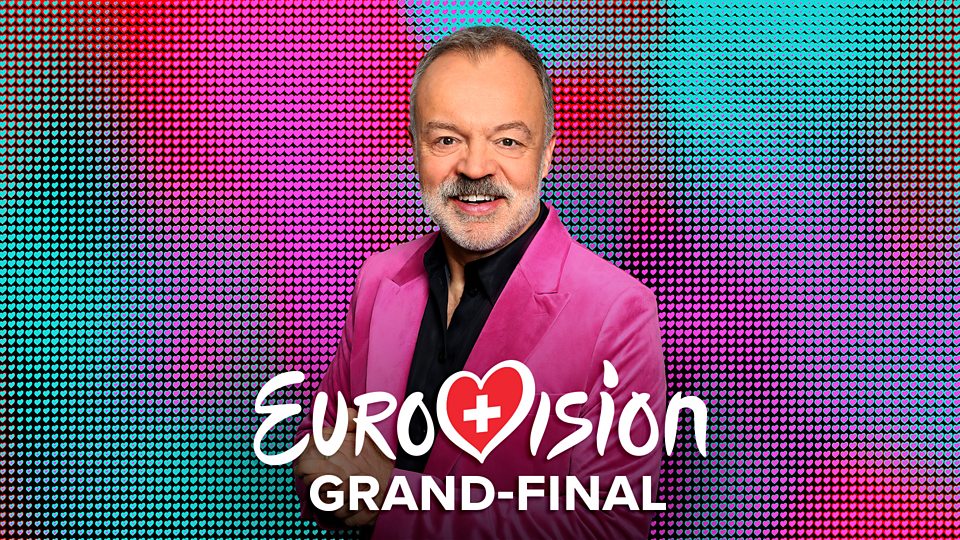The UK receives its first points from Luxembourgpublished at 23:16 BST 17 May
 Helen Bushby
Helen Bushby
Culture reporter
Remember Monday just got six points from Luxembourg!
Austria's JJ wins the 2025 Eurovision Song Contest in Basel, Switzerland
"Love is the strongest force in the world, let's spread more love," the 24-year-old says as he collects the trophy for his song Wasted Love
UK's Remember Monday collect nul points from the public, and place 19th overall - one place below Olly Alexander last year
Hosting a Eurovision-themed feast? Share with us how you're celebrating tonight's special show - we've already seen what might be the contest's youngest fan
Edited by Rorey Bosotti and Johanna Chisholm with Helen Bushby and Emma Saunders in London, and Mark Savage in Basel
 Helen Bushby
Helen Bushby
Culture reporter
Remember Monday just got six points from Luxembourg!
 Helen Bushby
Helen Bushby
Culture reporter
Doctor Who star Ncuti Gatwa was going to reveal how many points the UK jury was handing out tonight, but due to "unforeseen circumstances" it will now be Sophie Ellis-Bextor.
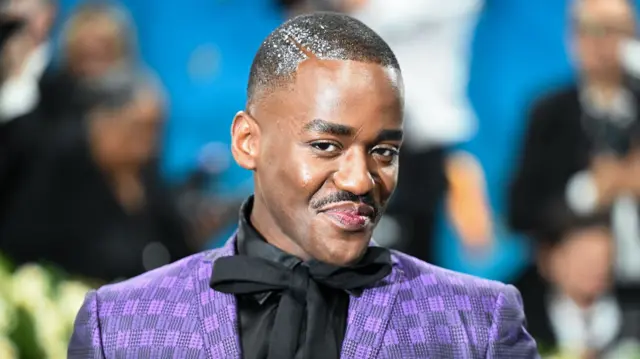 Image source, Getty Images
Image source, Getty ImagesThe BBC has not given any more information on the reason for Gatwa's withdrawal.
Singer and broadcaster Ellis-Bextor is clearly a fan of sequins, as well as the song contest.
“I love Eurovision and it’s a privilege to be part of 2025’s grand final," she said.
"What an honour it is to announce the UK’s jury score on such a special show which always puts music front and centre. I am very much looking forward to delivering the iconic douze points from the United Kingdom!”
In previous years the UK spokesperson's role has been taken on by Catherine Tate, Amanda Holden and AJ Odudu.
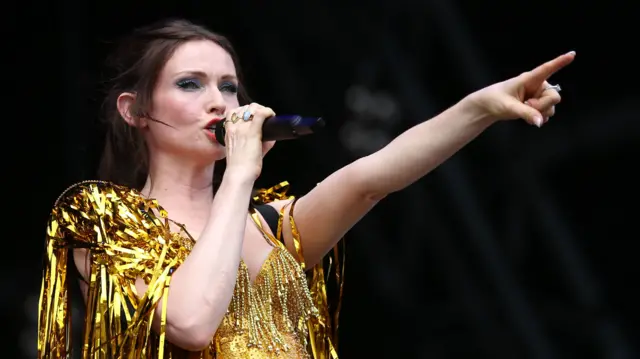 Image source, EPA
Image source, EPA Mark Savage
Mark Savage
BBC Music correspondent, reporting from the Eurovision final
Your time is up. The voting lines have closed. The tallies are being counted.
Whatever happens now, the winner of the 2025 Eurovision Song Contest has been decided.
We just have 45 long minutes to wait as the results are teased out…
 Andree Massiah
Andree Massiah
Live reporter

Ian, Kevin and Ashley from Cardiff are holidaying in Gran Canaria but that's not stopping them from seeing the show.
"We’ve been to the contest together each year since 2022," says Ashley.
"But this year we’ve decided to go on holiday to Gran Canaria instead and are watching the competition at a watch party here.
"We’ve always been fans of the competition but we thought we’d try something different this year due to high costs in Switzerland."
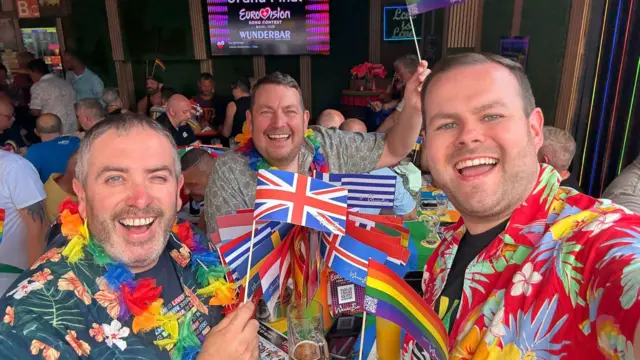 Image source, Ashley
Image source, Ashley Mark Savage
Mark Savage
BBC Music correspondent, reporting from the Eurovision final
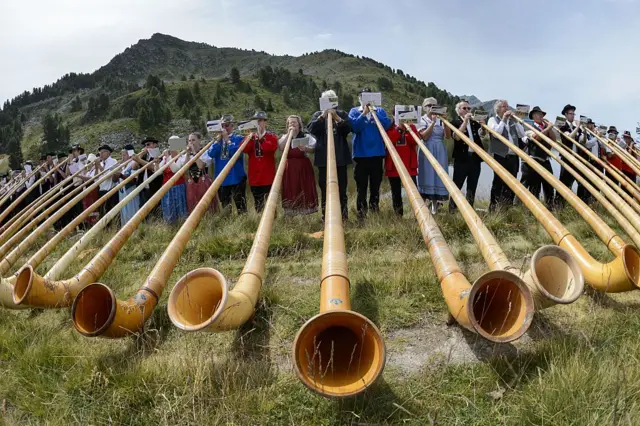 Image source, Getty
Image source, GettyOur host Michelle Hunziker has just been leading a crash-course in playing the Alphorn, the traditional Swiss instrument that's like a cross between the clarinet and the didgeridoo.
She brings up Poland's Justyna Steczkowska for a go, but all she can manage is a breathless puff. Probably spent all her energy hanging from those two ropes earlier tonight.
But it got me wondering - what instrument would we use in the UK? Bagpipes? A hurdy gurdy? The bladder fiddle?
Don't text in. Please.
 Mark Savage
Mark Savage
BBC Music correspondent, reporting from the Eurovision final
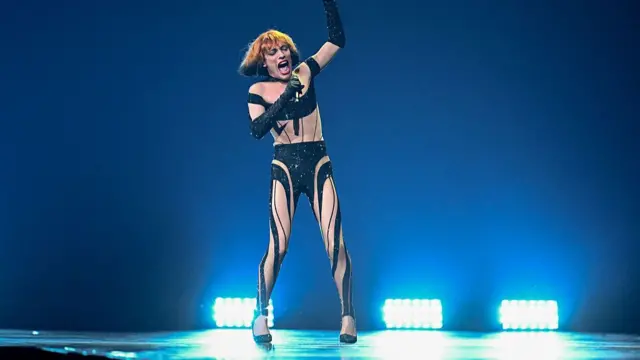 Image source, AFP via Getty Images
Image source, AFP via Getty ImagesAfter opening the show earlier, last year’s winner, Nemo, is back to play their new single Unexplainable.
It starts small, with Nemo alone in blue spotlight, wearing a Marlene Dietrich wig and a shimmering black bodysuit.
But keep an eye on that neon ladder… And get ready for the song’s explosively anthemic ending.
Seb Cheer
Reporting from the Eurovision Village in Basel
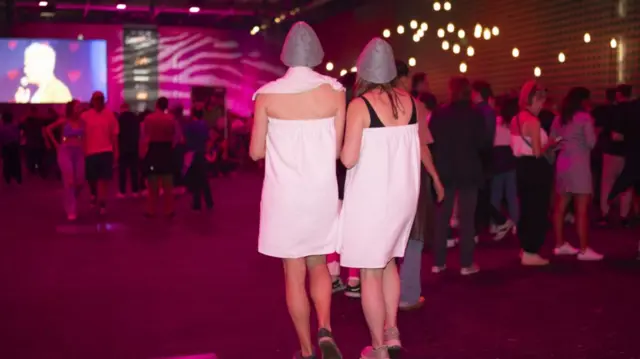 Image source, EPA
Image source, EPAFans of Sweden dress in towels
Ooo-ey-oo-ey-ooo... SAUNA!
It's clear to see why Sweden are the favourites to win in the fan village in Basel!
Thousands of people burst into song singing along to KAJ, with some attempting the group's now-iconic dance moves. I've even seen a couple of people dressed ready for a sauna.
Conversations around me have already turned to which Swedish city could host next year. We'll see...
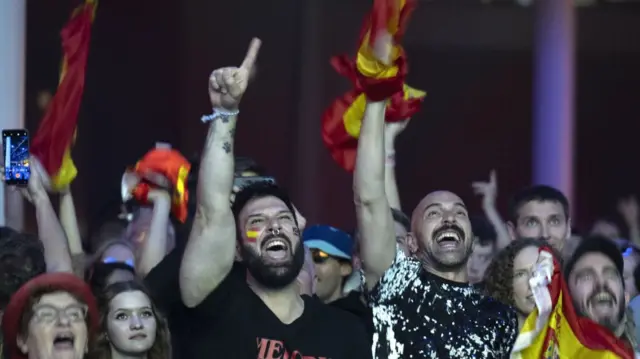 Image source, EPA
Image source, EPA Mark Savage
Mark Savage
BBC Music correspondent, reporting from the Eurovision final
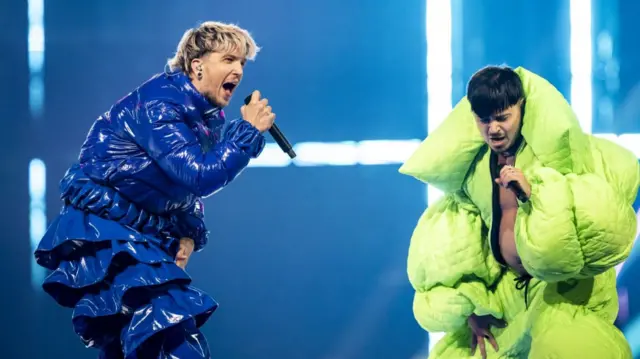 Image source, EPA
Image source, EPAFeast your eyes on this! Croatia’s Baby Lasagna (Eurovision 2024) and Finnish star Käärijä (Eurovision 2023) are duking it out on stage, with duelling versions of their songs Rim Tim Tagi Dim and Cha Cha Cha.
Both were predicted to win, and both came second – but their riotous, unhinged energy made them Eurovision legends anyway.
They come together at the end of their performance to play their new, collaborative single Eurodab. It’s chaotic. It’s ridiculous. It’s perfect.
 Lucy Manning
Lucy Manning
Special correspondent
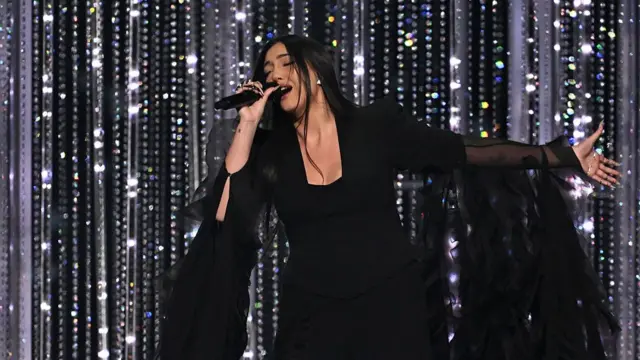 Image source, AFP via Getty Images
Image source, AFP via Getty ImagesThe Israeli delegation says its singer Yuval Raphael was left "shaken and upset" when two protesters tried to storm the stage during her Eurovisionperformance.
They were blocked by security officials.
The Israeli Kan broadcasting team says its delegation had to move location for 15 minutes because of the security issues but that it was "extremely proud" of her performance "which represented Israel in a respectful manner."
 Emma Saunders
Emma Saunders
Culture reporter
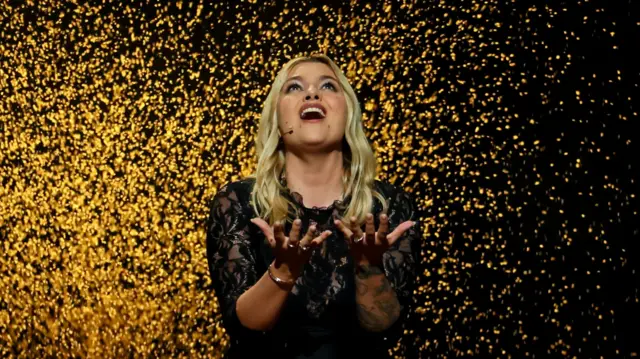 Image source, Reuters
Image source, ReutersOur host hasn't let us down with the one-liners tonight.
He seems to have a particular issue with plastics (eco-warrior vibes).
"I imagine the rivers in Latvia are very clean, not a plastic bag to be seen," he quipped when discussing Tautumeitas's costumes.
Armenia's Parg also didn't escape censure: "I dread to think how much sweat is sloshing around those plastic trousers."
And while he heaped praise on France's staging, which saw fake sand rain down on Louane, he warned: "There's a bit halfway through where Louane looks like she's had an explosive digestive problem."
Meanwhile, Denmark's Sissal looks "like she's trapped in a changing room in a large department store by some shop assistants."
Never change, Graham. Never change.
 Mark Savage
Mark Savage
BBC Music correspondent, reporting from the Eurovision final
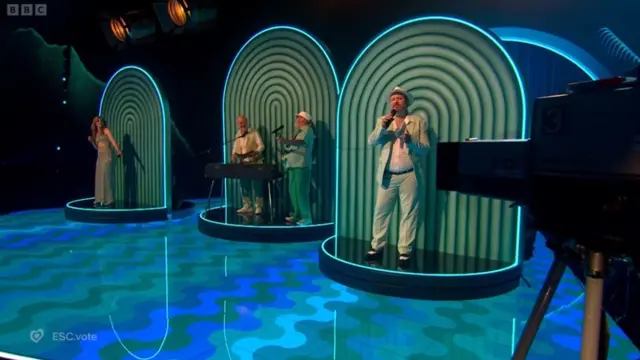
As the voting begins, Switzerland takes a moment to remind us of its history of success at Eurovision.
First on the stage are the folk trio Peter, Sue and Marc – who represented the country four times (and sang in a different language for each of their entries) between 1971 and 1981.
They’re followed by Paola, with a song and dance number recreating her 1980 entry Cinéma.
Next, we see Luca Hänni, whose Backstreet Boys-inspired hit She Got Me earned Switzerland fourth place in the 2019 contest. His success rejuvenated the country’s fortunes, after five years where they failed to qualify for the final.
And the performance finishes with Gjon's Tears, who was selected for the 2020 contest before it was cancelled amid the Covid-19 pandemic. He got to return the following year with Tout L'Univers, coming third.
They maintained that upward trajectory until last year, when Nemo took the title.
 Andree Massiah
Andree Massiah
Live reporter

Nessy with daughter Kayleigh and her fiancé Ash have been enjoying the show in East Sussex.
She says: "We love Eurovision and there are some good acts this year.
"Come on UK!"
 Image source, Newsy
Image source, NewsyAlbania's Zjerm was the final act of the contest.
You've now seen all 26 acts and hopefully you know by now who is your favourite!
You can vote by phone or by using the official Eurovision app.
For all the information on how to vote, you can check out our earlier post.
 Mark Savage
Mark Savage
BBC Music correspondent, reporting from the Eurovision final
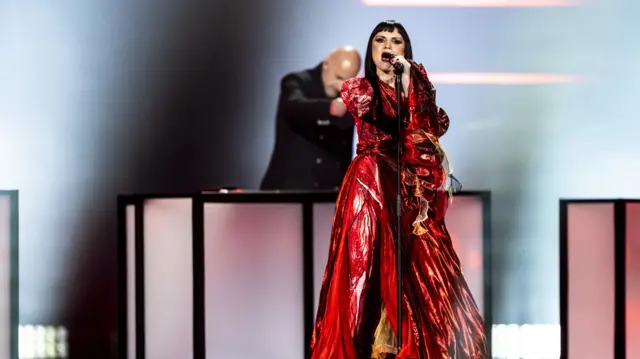 Image source, EPA
Image source, EPASome of Eurovision’s best songs bridge the gap between their country’s folk traditions and the strident rhythms of modern pop.
That’s exactly what tonight’s last act, Shkodra Elektronike, are doing on Zjerm, which opens with the çiftelia, a traditional two stringed instrument from Albania, then distorts it with a buzzing electric pulse.
Constantly evolving, Zjerm is meant to evoke the band’s hometown, Shkodër – a centre of religious harmony, where half the population is Muslim and half is Catholic.
In the lyrics, they honour that tradition by singing “Aman misere” – combining the Aarabic word for sanctuary, and the Latin phrase for “have mercy”.
In a competition whose slogan is “United By Music” there couldn’t be a more perfect way to wrap things up.
 Mark Savage
Mark Savage
BBC Music correspondent, reporting from the Eurovision final
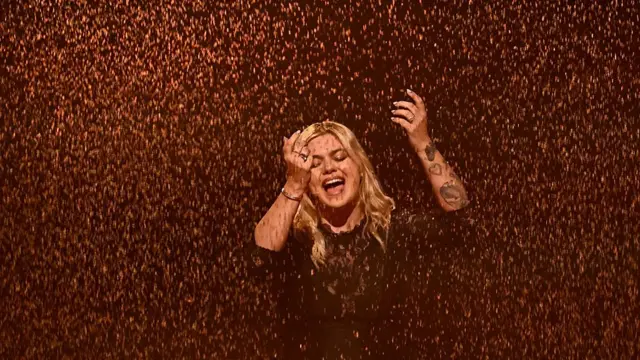 Image source, Getty Images
Image source, Getty ImagesThat was a hugely impressive performance - but can you imagine how much extra Louane's hotel is going to charge after cleaning out her shower all week?
 Mark Savage
Mark Savage
BBC Music correspondent, reporting from the Eurovision final
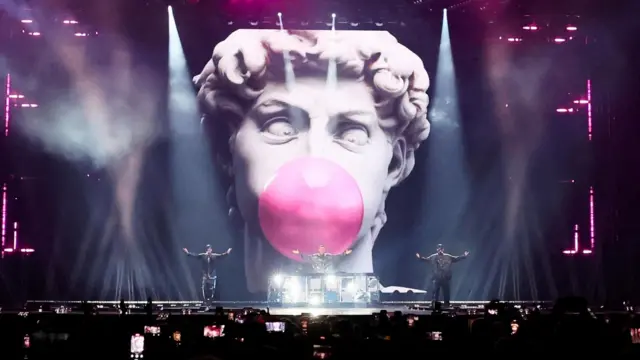 Image source, Reuters
Image source, ReutersTutta L’Italia is the second song of the night to pay tribute to Italian culture, after Tommy Cash’s Espresso Macchiato.
This one’s a little bit more sincere, though, with references to spaghetti, wine, football, “Our Father” the Pope and the Mona Lisa – under her Italian name Giaconda.
It was written by DJ Gabry Ponte – best known for producing Eiffel 65’s Blue (Da Ba Dee) – and originally used as the interstitial music for Italy’s Sanremo Music Festival, where the country chooses its own Eurovision entry.
The song’s chanted chorus became such an earworm that San Marino nabbed it for themselves, despite the country’s steadfast independence from Italy.
The staging is a problem, though, with Gabry marooned behind his DJ decks and two masked men performing the hook.
The singers, rumoured to be Ponte’s co-writers Andrea Bonomo and Edwyn Roberts, want to remain anonymous for reasons that have never been explained. National pride? Witness protection? Who knows.
 Nadia Ragozhina
Nadia Ragozhina
Reporting from the Eurovision Song Contest
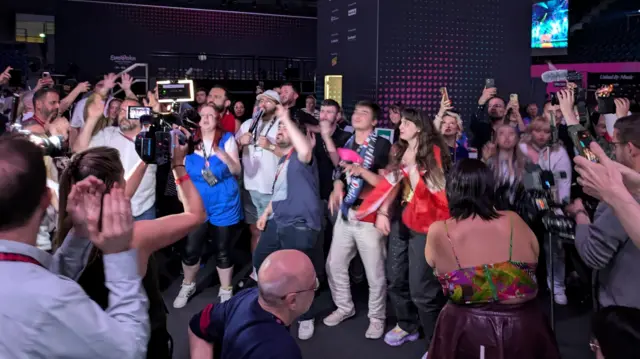 Image source, Nadia Ragozhina/BBC
Image source, Nadia Ragozhina/BBCA great reception for Sweden's Bara Bada Bastu in the media centre - with lots of people singing along and dancing, but almost as many, if not more, filming them!
 Mark Savage
Mark Savage
BBC Music correspondent, reporting from the Eurovision final
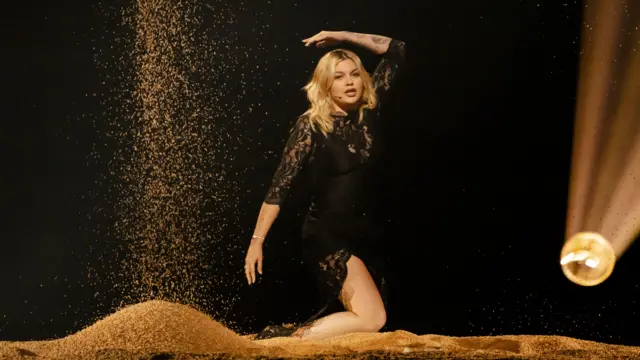 Image source, EPA
Image source, EPAThere’s a little bit of disquiet backstage about France’s performance – as the country have been given much longer to set up their stage than the regulation 35 seconds.
In one rehearsal, there was a five-minute gap between KAJ leaving the stage and the first note of Louane’s Maman.
That’s partly because of the ambitious staging, which sees the singer swept up in a tornado of actual sand.
But behind-the-scenes sniping can’t detract from this exquisite torch song, which is presented as a conversation between the singer and her mother, who died of cancer when she was 17.
“It's a song about my late mother, and it's a song that says that even through sadness and deep pain, you can finally feel fine,” she says.
“And it's also a song about the fact that I am myself, a mother, and you can hear my daughter's voice at the end of it.”
 Helen Bushby
Helen Bushby
Culture reporter
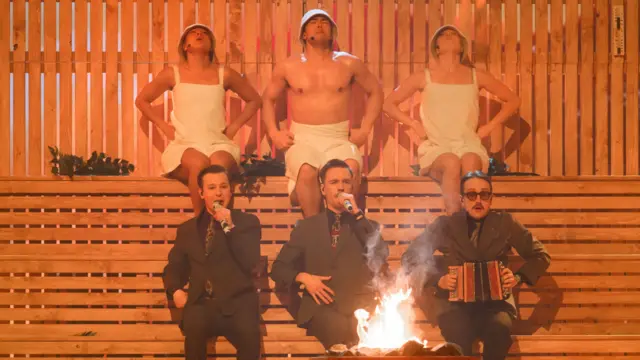 Image source, Getty Images
Image source, Getty ImagesSweden's entry KAJ are from Finland
This question may not have been on the tip of your tongue, but who doesn't love a bit of Eurovision trivia?
So - Sweden’s entrant, KAJ, is a band from Finland, while Germany's band Abor & Tynna are from Austria. They're all practically neighbours...!
Ireland's entrant Emmy, who unfortunately didn't get through to the final with her song about a Russian space dog, is from further afield, in Norway.
It's also worth noting that Estonia and San Marino have written songs about how much they love Italy.
Eurovision is all about bringing people together so its permanent slogan "United By Music", external seems very pertinent here.
 Mark Savage
Mark Savage
BBC Music correspondent, reporting from the Eurovision final
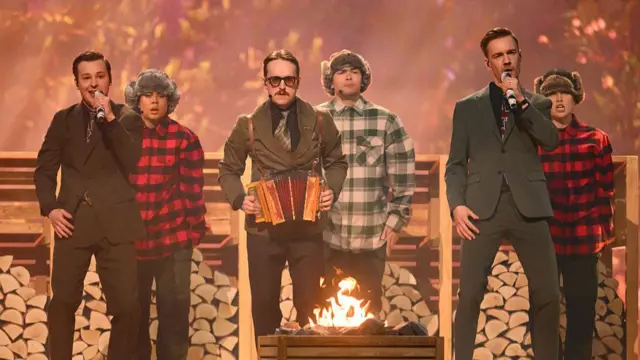 Image source, AFP via Getty Images
Image source, AFP via Getty ImagesGet your towels ready, KAJ are about to raise the temperature with a visit to the sauna.
The group were surprise winners at Sweden’s hotly-contestant Melodifestivalen, the country’s national final, where they beat former Eurovision winner Måns Zelmerlow.
Måns was so incensed that he went backstage to vent his anger. "I was a bit annoyed. I kicked some stuff," he said on air – suggesting he’s not the most gracious of losers.
Still, Sweden’s voters chose well. KAJ’s comedy song has been endorsed by Abba’s Bjorn Ulvaeus, and spent 12 weeks at the top of the Swedish charts – making it one of the country’s longest-running number ones of all time (although it’s a long way from beating Baccara’s Yes Sir, I Can Boogie, which somehow spent 22 weeks at the top in 1977).
Going into Eurovision, Bara Bada Bastu is the runaway favourite, with bookies giving it a 40 per cent chance of winning.
But like KAJ in their sauna, we’ll have to sweat it out for a few hours before the result comes in.
